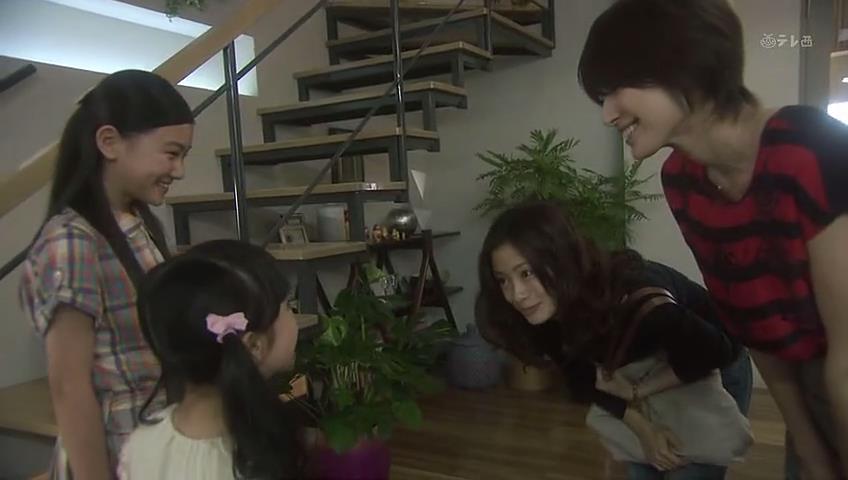Let's bring the third part of the expressions from Hirugao! We're still in the first episode, because it was simply great! Today you'll learn a bit edgy - but still usable - language! ;) Enjoy!
夫は同性愛者ではありません。美しくありたいだけです。
otto ha dou-sei-ai-sha de wa arimasen. utsukushiku aritai dake desu.
-My husband isn't gay. He just wants to be pretty.
あたしは若い男とチャラチャラ不倫をするより、暖かい家庭が作りたいんです。
atashi ha wakai otoko to chara-chara furin wo suru yori,atatakai ka-tei ga tsukuritai ndesu.
- Instead of fooling around with young men, I want to create a loving home.
And a long passage for today - Sawa-chan's prayer (or actually, a curse) !
(1)神様ごめんなさい。あたしのしてしまったことは本当にいけないことです。心からお詫びして改めます。
(2)でも、一つだけ言わせてください。あんな素敵なおうちと家族がいるのに、不倫するなんて罰当たりです!
(3) どうか、あの女の不倫が旦那さんにバレて、地獄に堕ちますように。
(1) kamisama gomennasai. atashi no shite shimatta koto ha hontou ni ikenai koto desu. kokoro kara o-wa-bi shite aratamemasu.
(2) demo, hitotsu dake iwasete kudasai. anna suteki na o-uchi to kazoku ga iru noni, furin suru nante bachi-atari desu!
(3) douka, ano onna no furin ga, danna-san ni barete, jigoku ni ochimasu you ni.
- (1) "Dear God, please forgive me. The thing I did was really wrong. I apologize from the heart, and reflect on my behavior /literally: I will correct it/ "
- (2) "But let me say just one thing. (The fact that) one has such admirable house and family but still is cheating, is outrageous."
- (3) "(Please), somehow, let this woman's romance be exposed by her husband, and may she fall into the depths of hell!"
* The.ending "~you ni" literally means I hope, I wish for . It's used in prayers and eg. birthday wishes.
That was pretty intense, huh? Tell me how you like it so far! Remember to share the lesson with your friends! じゃね!
夫は同性愛者ではありません。美しくありたいだけです。
otto ha dou-sei-ai-sha de wa arimasen. utsukushiku aritai dake desu.
-My husband isn't gay. He just wants to be pretty.
あたしは若い男とチャラチャラ不倫をするより、暖かい家庭が作りたいんです。
atashi ha wakai otoko to chara-chara furin wo suru yori,atatakai ka-tei ga tsukuritai ndesu.
- Instead of fooling around with young men, I want to create a loving home.
 |
| Hirugao ep.1/Photo:Ritsunodoramaland.wordpress.com |
And a long passage for today - Sawa-chan's prayer (or actually, a curse) !
(1)神様ごめんなさい。あたしのしてしまったことは本当にいけないことです。心からお詫びして改めます。
(2)でも、一つだけ言わせてください。あんな素敵なおうちと家族がいるのに、不倫するなんて罰当たりです!
(3) どうか、あの女の不倫が旦那さんにバレて、地獄に堕ちますように。
(1) kamisama gomennasai. atashi no shite shimatta koto ha hontou ni ikenai koto desu. kokoro kara o-wa-bi shite aratamemasu.
(2) demo, hitotsu dake iwasete kudasai. anna suteki na o-uchi to kazoku ga iru noni, furin suru nante bachi-atari desu!
(3) douka, ano onna no furin ga, danna-san ni barete, jigoku ni ochimasu you ni.
- (1) "Dear God, please forgive me. The thing I did was really wrong. I apologize from the heart, and reflect on my behavior /literally: I will correct it/ "
- (2) "But let me say just one thing. (The fact that) one has such admirable house and family but still is cheating, is outrageous."
- (3) "(Please), somehow, let this woman's romance be exposed by her husband, and may she fall into the depths of hell!"
* The.ending "~you ni" literally means I hope, I wish for . It's used in prayers and eg. birthday wishes.
That was pretty intense, huh? Tell me how you like it so far! Remember to share the lesson with your friends! じゃね!

Comments
Post a Comment